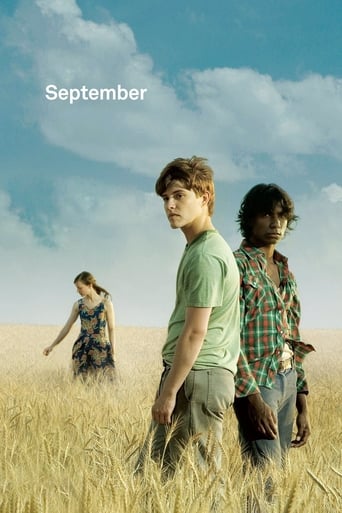

This film is set in 1968, an interesting era in history.Someone has questioned the family's financial position as wheat farmers, so here is a little context. Following on the wheat boards formed during the wars in Australia for the government to buy all wheat harvested, the wheat board guaranteed a minimum price paid to farmers, based partly on the cost of production with a certain profit margin. As the wheat belt in WA expanded, marketing arrangements were revised to reduce this subsidy and drop the guaranteed price in 1968. In 1969 the government considered there was an oversupply of wheat, which led it to bring in some quite severe production quotas (which prompted Leonard Casley of Hutt River to protest, try and claim compensation from the Queen, and eventually secede to form Australia's oldest micronation). The same year a severe drought in WA reduced the area sown by something like a third. At the same time, political pressure was mounting towards a freer, less supported market and although it wasn't really deregulated until twenty years later, the first critical changes were made in this period. It was an interesting time to be a wheat farmer and one which many farmers, particularly those advancing into new and marginal cropping areas, did not survive.Non-Australian viewers may not be aware that it was also an interesting era in Australia's largely shameful colonial indigenous history. A national referendum in May 1967 approved amendments to the constitution to allow Aboriginal people to be counted as part of the population (and also allowed the Federal government to make laws just for Aboriginal people). Many other political events occurred during this era such as fights for land rights and equal pay (separate to the referendum). NT stockmen won equal pay in 1966. Changes to Federal departments in the early 1970s saw the end of the policies and processes that led to the Stolen Generations. It was a time of major upheaval and increasing rights for Aborigines, but not without some resistance and dissent from the white population. Particularly in the farming community, which I know from experience in the WA wheatbelt still has a strong redneck element to this day (who else would elect Wilson Tuckey for 30 years?).It is interesting to note that women in Australia also did not get equal pay until laws were passed in 1969.The film is quietly paced and very subtle, with atmospheric and powerful cinematography. It is almost peaceful the way the scenes pass across the screen. Two good-looking, seemingly quite young families. Two fathers, two wives, two sons. The Aboriginal family with a couple of extra mouths to feed. Each family with a dog or two. Powerful contrasts and comparisons of daily lives. I thought there were some omissions in the way the separate lives were filmed but perhaps that put more emphasis on what we did see.I suspected the slow pace of the film would be interrupted by some terrible event, but everyone was still standing at the end, to my relief. I was happy to note that the cross-cultural tensions were based on friendships between men and men, boys and boys, not the more frequently seen cross-cultural romance.A nice film for a lazy spring afternoon in.
... View MoreThis is a story about two families, one a white generational wheat farmer and the other the aboriginal family indentured to the farm who are not paid but are given food and lodging and nothing else. They live 40 miles from town and 2 miles from the nearest neighbour. Dialogue is minimal as it would be in these circumstances with them being simple, quiet people.The two boys mirror their father, who mirrored theirs so we know what is the destiny of the boys as it is mapped out for them. The change is the granting of rights to the aboriginals such as a right to a salary. This has consequences to both families.The film reflects the speed of life in the beautifully shot countryside, yes very little happens but the small bits are tiny bright gems.I'm sorry they tried to put a little of the "coming of age" bit as it felt over-sentimentalised as these boys would have been quite worldly in things such as boxing, driving etc
... View MoreIt was an unusual film to see at the festival just because I wasn't used to such a slower paced film.I think in North America, we're so used to the plot being given to us blatantly that when a film like this comes along, it feels so foreign and so... different.There are some moments in the film when I wanted the pace to quicken a little bit. It is like others have said a very character-driven movie.It's not the worse movie I saw at the festival because at least it had a plot and something to say but I wouldn't say it was the best.The director to me tries to make you fill in the gaps - like a book - rather than having everything said aloud. (There were a lot of silent moments... some of which were painfully long) Nevertheless, I still found it interesting to watch. Whether I would recommend it to someone, well, if you fancy something different from what you're used to North America (a slower-paced film) then go ahead and watch this film.
... View MoreI just finished screening "September" at the Toronto International Film Festival and I was more than impressed with this feature. The film is perfectly paced, has a meaningful plot and flawless acting. A well written screenplay builds a beautiful story about racial differences between friends, old and young, and how color and class can interfere with and shape human bonds and heart-felt relationships. This is a truly unique and beautiful Australian film with a cross-cultural theme and emotional resonance, not to mention the beautiful cinematography of a very isolated and serene part of Australia. I would definitely recommend this film and also see it again.
... View More